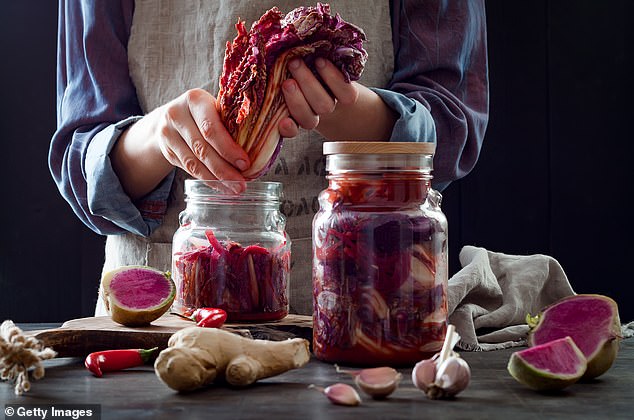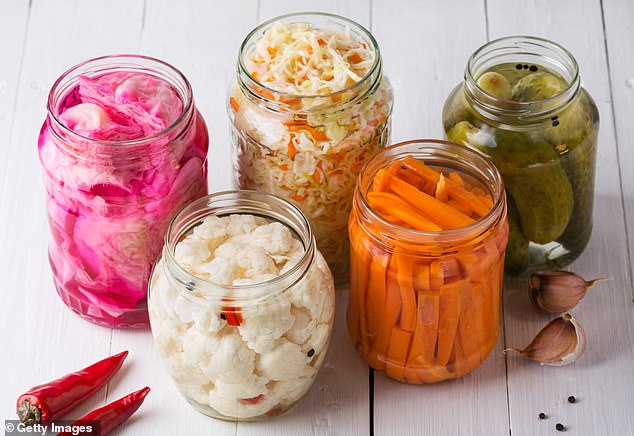Trendy fermented foods could be making you sick, top scientists say, as they reveal the biggest culprits causing allergies, rashes, upset stomachs and potentially deadly infections
Fermented foods have never been more popular. Demand for kimchi, kefir and sauerkraut has skyrocketed in recent years, thanks to their reportedly beneficial effects on gut health.
So much so that fermented foods have now become a regular part of everyday life, according to a report from Waitrose last December, which found that sales of kimchi (a traditional Korean dish made from salted and fermented vegetables) had increased by 44 percent compared to the previous year.
Fermented foods are made by using bacteria or yeast to break down natural sugars. Some, such as yogurt and kefir, contain probiotics: strains of bacteria that are good for gut health.
Other fermented foods undergo pasteurization, smoking, baking or filtering. While this destroys the living bacteria, there can still be health benefits – for example, kimchi contains lactic acid, which boosts the immune system; while sourdough bread contains fiber, important for gut health.
‘Fermentation was originally used as a method of preserving food, but today fermented foods are valued for their potential health benefits,’ says Bahee Van de Bor, dietitian and spokesperson for the British Dietetic Association.
According to a Waitrose report last December, fermented foods are now a household staple.

Fermented foods are now often seen as an important way to increase our ‘good’ gut bacteria and thus improve the health of our microbiome.
Today, these foods are often seen as an important way to increase the “good” bacteria in the gut and improve the health of our microbiome, the community of diverse microorganisms that is linked to better digestion, lower inflammation, and stronger immune and mental health.
But are they good for everyone?
Experts are now warning that some people, especially those with weakened immune systems, should be careful about eating it.
This follows a recent discovery from Ohio State University in the US that some fermented foods, such as kimchi and artisanal cheeses, contain antibiotic-resistant bacteria. These can cause intestinal symptoms such as vomiting and diarrhoea, or even more serious health problems, such as potentially fatal sepsis, if they enter the bloodstream.
The study, which has not yet been peer-reviewed, looked for antibiotic-resistant microbes in 10 types of kimchi and four artisanal cheeses that had not previously been screened for antibiotic-resistant bacteria. Nine of the kimchi products and all four cheeses contained antibiotic-resistant bacteria.
They also contained a variety of lactic acid bacteria, which drive fermentation, and were resistant to certain antibiotics.
One kimchi product tested contained a strain of Weissella, a bacteria that is highly resistant to antibiotics. Severe cases of Weissella infection have been linked to endocarditis (infection of the lining of the heart), osteomyelitis (infection of the bone), and even death. Most cases occur in people who already have weakened immune systems, such as from chemotherapy.
Some Weissella strains have been linked to bacterial resistance to many antibiotics, says Dr Manal Mohammed, senior lecturer in medical microbiology at the University of Westminster.

Fermented foods provide a variety of bacteria that can boost gut diversity, plus extra vitamins and minerals. Kimchi contains lactic acid, which boosts the immune system

Some fermented foods, such as yogurt and kefir, contain probiotics: strains of bacteria that are good for gut health.
And researchers noted that those most likely to consume more fermented foods — for example, to improve gut health after an illness or a course of antibiotics, which kill good and bad bacteria — were actually at greatest risk of acquiring antibiotic-resistant bacteria because their immune defenses were low.
‘In this scenario, it is safer to take supplements of specific strains of probiotics to restore gut health,’ advises Ms Van de Bor. These include probiotics for treating antibiotic-associated diarrhoea, such as Lactobacillus rhamnosus, and the yeast Saccharomyces boulardii, which is effective in preventing infection-associated diarrhoea.
According to Ms Van de Bor, the question is whether eating fermented foods is ‘better’ for improving intestinal health in general than taking a targeted, specific probiotic.
Fermented foods typically contain a variety of bacteria that can increase diversity in the gut, plus additional vitamins and minerals.
“However, specific probiotics may offer specific benefits, such as a reduction in antibiotic-associated diarrhea, abdominal pain, and bloating related to IBS, as well as improving gas and bowel regularity in adults,” she says.
Dr Mohammed adds that the discovery of antibiotic-resistant probiotics in fermented foods is “very alarming” and that feces contaminated with these substances “may contribute to the spread of antibiotic resistance in the environment”.
Consuming antibiotic-resistant probiotics could lead to the general population building up antibiotic-resistant genes, she adds. But that’s not the only concern.
‘Some fermented foods, such as old cheese and fermented soy products, contain a lot of histamine. This can cause symptoms such as headaches, skin rashes and digestive problems in people with histamine intolerance,’ says Mrs Van de Bor.
Histamine intolerance affects up to 3 percent of the population. People with the intolerance do not produce enough of the enzymes that naturally digest histamine, resulting in excess histamine circulating in the bloodstream and causing symptoms.

Fermented foods are made through fermentation, which uses bacteria or yeast to break down natural sugars
Fermented foods can also lead to painful gas and bloating, Dr. Mohammed adds. “Probiotics secrete small protein molecules that kill harmful gut bacteria and fungi, resulting in gas and bloating,” she explains.
Bloating is often seen as a sign that pathogenic “bad” bacteria are being removed from the gut. Probiotics cause increased gas production, so it’s a sign that they’re doing their job.
However, Dr Mohammed adds: ‘Some people may experience severe bloating, which can be very painful.’
Although most fermented foods are safe, they can become contaminated with disease-causing bacteria, leading to an outbreak of salmonella poisoning, for example.
For this reason, people with weakened immune systems, such as those undergoing chemotherapy or organ donors, should avoid fermented foods, Dr. Mohammed warns. These groups may be more susceptible to bacteria that can cause side effects such as diarrhea, fever and muscle aches.
People with digestive disorders like irritable bowel syndrome (IBS) and inflammatory bowel disease (IBD) may also be more prone to gas and bloating when consuming certain probiotics, so it’s important to consult with their doctor or dietitian before adding fermented foods to their diet, Dr. Mohammed says.
Pregnant women should be careful about eating fermented foods to avoid the risk of bacterial contamination.
Babies under one year old should also not eat certain fermented foods, such as unpasteurized cheese or fermented meats, such as chorizo and salami, due to the risk of food poisoning.
In addition, the salt content in certain fermented foods, such as sauerkraut and miso, can be high, so people with high blood pressure or kidney disease who are on a low-sodium diet may want to avoid these foods, says Ms. Van de Bor.
What’s more, while experts agree that there’s good evidence for the health benefits of certain probiotics, the same isn’t true for fermented foods in general. “It’s more anecdotal than scientific,” says Bridgette Wilson, a researcher specializing in gut health at King’s College London.
‘Some are probably less beneficial than others. For example, trying to use sourdough bread to change your gut microbes probably won’t do much because there aren’t many living microbes left after baking.’
She adds that foods containing probiotics, such as yogurt and kefir, can improve gut health, as long as you know exactly what’s in them. Artisanal products often don’t include much detail about their production or contents, making it difficult to judge their value.
Ms Van de Bor adds that it is important to ‘choose starter cultures that have been screened by a reputable company and pasteurised milk to reduce the risk of unwanted bacteria getting into the food’ if you want to ferment things yourself.
Dr. Mohammed adds: “Fermented foods are safe and healthy, but moderation is key.”
Ms Van de Bor warns: ‘Fermented foods have become very trendy recently, but ultimately there is stronger evidence for the health benefits of eating five servings of fruit and vegetables a day, wholegrains and legumes, than of large amounts of kimchi.’
